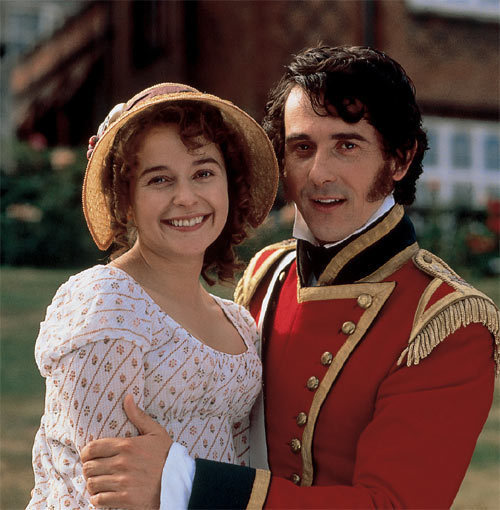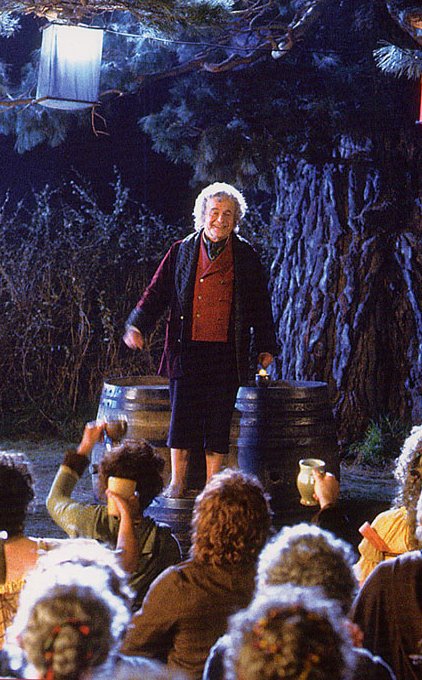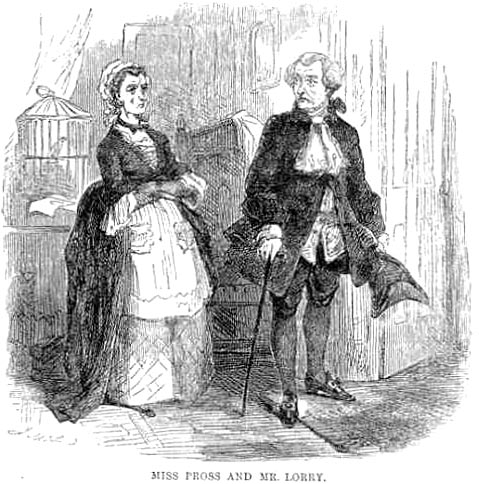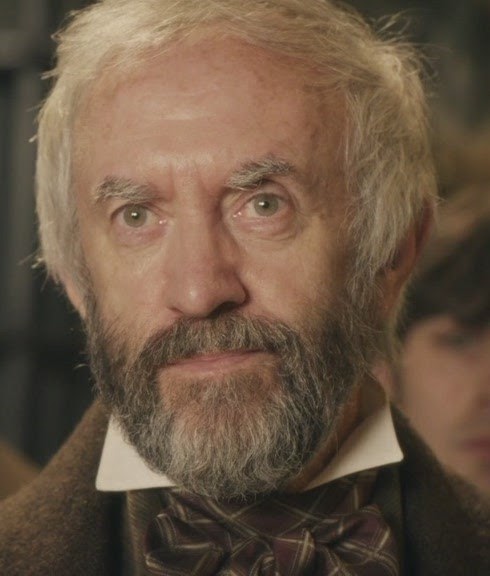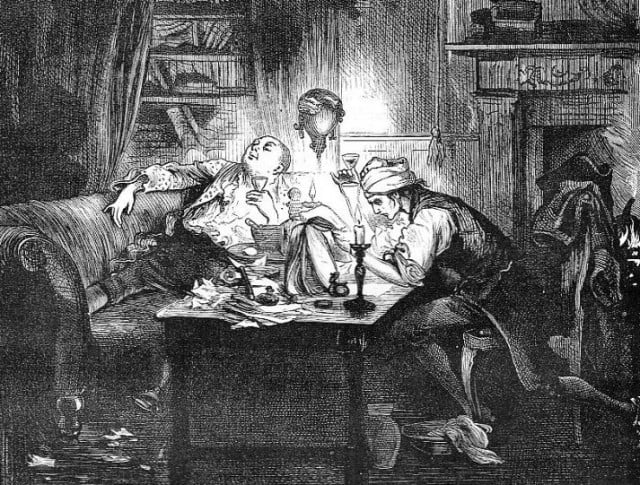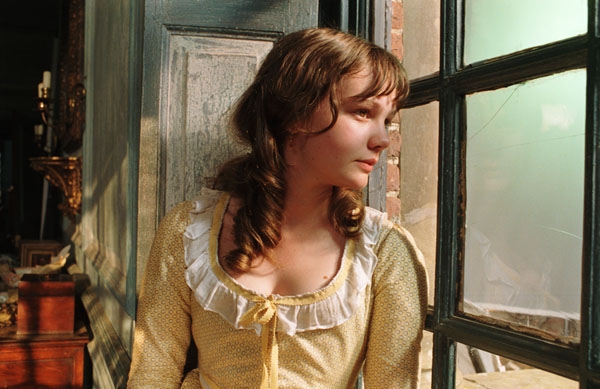I haven't often spoke of my affinity for J. R. R. Tolkien's Lord of the Rings on this blog.
 |
| I think Tolkien's signature is super cool. |
But I assure you, my affection for this book is strong, and to demonstrate this, my post-that-is-technically-for-the-classics-challenge is more enumeration of things I love than a proper review. I shall endeavor to be as spoiler free as possible, but I give no promises as to conciseness.
To start, I would like to say that I watched the movies before I read the books. In general, it's better to read the book first, but there are some cases where it doesn't much matter (e.g. Ella Enchanted). This is not the case with The Lord of the Rings. I strongly recommend that you read the book first. Read the book first. Please. Don't follow my example. Although I fell in love with the story from the first moment of hearing Galadriel's voice, and afterward wanted to read the book, and did so, I would have had a greater appreciation for the book if I had not first read the movie. For, one tends to be more partial to the first thing, and so I started the book with a "this isn't like the movie" perspective, rather than a "what a wonderful story" perspective.
The movies, albeit
very good renditions of the book, and truly spectacular films in and of themselves, are not as good as the books. Things are changed, obviously. Not just rearranging scenes and cutting dialogue because it has to be shortened, but other changes which do bother me. (I shall shortly link to a guest post that I wrote for
The Red Book where I go into more detail about these changes.) Not to say that I don't recommend it — don't even get me started on that glorious soundtrack!
One objection that is often — and with reason — given against the movies is the violence and gore. There are three major battles, many skirmishes, and frankly, not a few disgusting orcs. (Plus Sméagol's transformation.) The book, however, does not tell us all the details of rolling heads and dripping blood. The battles are tastefully described, Tolkien apparently feeling that he "had no right to wound our feelings by attempting to describe" gore.*
Not having heard any else AGAINST The Lord of the Rings, I shall proceed to share the many reasons FOR it.
1. The themes. The classic struggle between good and evil is so poignantly played out. Although the dialogue is not from the book, this scene almost makes me cry. "But in the end, it's only a passing thing, this shadow." That theme, if not the line, is in the book. Yes, I know Tolkien did not intend his book to be an allegory, but when a strong Christian writes a thing, Truth will show, and in the temptation of the Ring, the temptation of sin that we face each day is well-portrayed. If you've already read the book or seen the movie, this page talks about Christ figures in the book, and I found it quite interesting. It does contain spoilers.
2. The words. Oh, there's so many quotes I could quote. I love Tolkien's description (and the dialogue is good too, but I quote mainly the description because it's just so great.). He uses personification and metaphor generously.
I don't know half of you half as well as I should like; and I like less than half of you half as well as you deserve. This was unexpected and rather difficult. There was some scattered clapping, but most of them were trying to work it out and see if it came to a compliment.
So do all who live to see such times. But that is not for them to decide. All we have to decide is what to do with the time that is given us.
Deserve it! I daresay he does. Many that live deserve death. And some that die deserve life. Can you give it to them? Then do not be too eager to deal out death in judgement. For the even the very wise cannot see all ends.
The quest may be attempted by the weak with as much hope as the strong. Yet such is oft the course of deeds that move the wheels of the world: small hands do them because they must, while the eyes of the great are elsewhere.
In this high place you may see the two powers that are opposed to another; and ever they strive now in thought, but whereas the light perceives the very heart of the darkness, its own secret has not been discovered.
The day waned, and dusk was twined about the boles of trees.
Cold clammy winter still held sway in this forsaken country. The only green was the scum of livid weed on the dark greasy surfaces of the sullen waters. Dead grasses and rotting reeds loomed up in the mist like ragged shadows of long forgotten summers.
There was a deep silence, only scraped on its surfaces by the faint quiver of empty seed-plumes, and broken grass-blades trembling in small air-movements that they [the hobbits] could not feel.
For a while they stood there, like men on the edge of a sleep where nightmare lurks, holding it off, though they know that they can only come to morning through the shadows.
The level shafts of the setting sun behind beat upon it, and the red light was broken into many flickering beams of ever-changing color. It was as if they stood at the window of some elven-tower, curtained with threaded jewels of silver and gold, and ruby, sapphire and amethyst, all kindled with an unconsuming fire.
3. The poems. There are quite a lot of poems in this book, so I could hardly name my favorite. Here are two that I particularly love, incidentally both composed by Bilbo:
All that is gold does not glitter,
Not all those who wander are lost;
The old that is strong does not wither,
Deep roots are not reached by the frost.
From the ashes a fire shall be woken,
A light from the shadows shall spring;
Renewed shall be blade that was broken:
The crownless again shall be king.
The Road goes ever on and on
Down from the door where it began
Now far ahead the Road has gone,
And I must follow, if I can,
Pursuing it with eager feet,
Until it joins some larger way
Where many paths and errands meet.
And whither then? I cannot say.
I also like the song of Nimrodel, but it's rather long to quote here. (And basically all the rest of the poems.)
Oh, okay, two more (the first by Sam):
The finest rockets ever seen:
they burst in showers of blue and green,
or after thunder golden showers
came falling like a rain of flowers.
Where now the horse and rider? Where is the horn that was blowing?
Where is the helm and the hauberk, and the bright hair flowing?
Where is the hand on the harpstring, and the red fire glowing?
Where is the spring and the harvest and the tall corn growing?
They have passed like rain on the mountain, like a wind in the meadow;
The days have gone down in the West behind the hills into shadow.
Who shall gather the smoke of the dead wood burning,
Or behold the flowing years from the Sea returning?
4. The characters. If anyone can watch all three movies or read the book and not adore Samwise Gamgee, I'm not sure what I think of this person. Sam is so loyal, humble, hardworking. He is very hobbity — not a noble king, not an all-knowing wizard, just a simple hobbit with a love for simple beauty and goodness. Yet he is as strong as any of the more dashing heroes in the book, or stronger. I have heard other people make disparaging remarks about Frodo, calling him "weak" and mocking how he *SPOILER* fails in fighting Shelob. *END SPOILER* Okay, how about you carry the embodiment of evil around your neck into Hades, let's see how strong you act. Frodo is very strong. To keep going when all hope is gone, to just keep walking, is no light thing for one in his situation. Frodo — hobbits in general, really — is undervalued. Which is rather ironic, because a good deal of the book is about how undervalued they are.
I used to dislike Tom Bombadil (another unfortunate effect of watching the movies first), but now I like him, though I find him very enigmatic. He seemed too silly and confusing to fit the rest of the book, but now I appreciate him. Not everything needs to be explained. And I like that his inclusion makes the Ring and Sauron smaller. There is no evil so great that good is not stronger.
Aaaand there's Aragorn, of course, who I fell in love with from his first scene in the movie. Humble, noble, wise, skillful, courageous.
Of course, Gandalf is amazing also. He is so wise. And puzzling. And while he certainly can't do everything, he is a very useful person to have in a tight spot.
Theoden is also wonderful. Like Gandalf, he is not a perfect leader, but he sincerely tries to do what is best for his people. I pity him and admire him.
I love Faramir in the book. He treats the hobbits with greater honor and consideration than the movie shows. (I have always preferred him to Boromir, since I've never identified with the strong war-loving type.) Instead of seeming unfair, he does consider carefully the hobbits case, and makes a decision in their favor, which puts himself at risk.
 |
| I have not even mentioned Legolas and Gimli, or Bilbo or Eowyn. But this post grows long. Suffice to say they're very well done too. |
All in all, I'm very fond of most of the characters in the story, and I think that's a good deal of what's necessary for a good book. If you don't care what happens to the characters (*coughcoughdivergentcoughcough*), you aren't likely to care about the story, or for that matter, keep reading it at all, especially when it's a thousand pages long.
5. The world of Middle Earth. It is so creative and detailed. Each race — elves, dwarves, hobbits, Men, orcs, wizards — is unique. Tolkien created languages for these people. The hobbits get the most description in the book itself, but the appendices is full of further information on the others. The many places they visit are differentiated too. Contrast the simplicity of the Shire with the grandeur of Minas Tirith, or the darkness of Mordor with the peace of Rivendell. Even places which are more similar — Rivendell and Lothlorien, or Gondor and Rohan — are still unique. Gondor has much more of a High Middle Ages feel, while Rohan has a distinctly more Beowulf character.
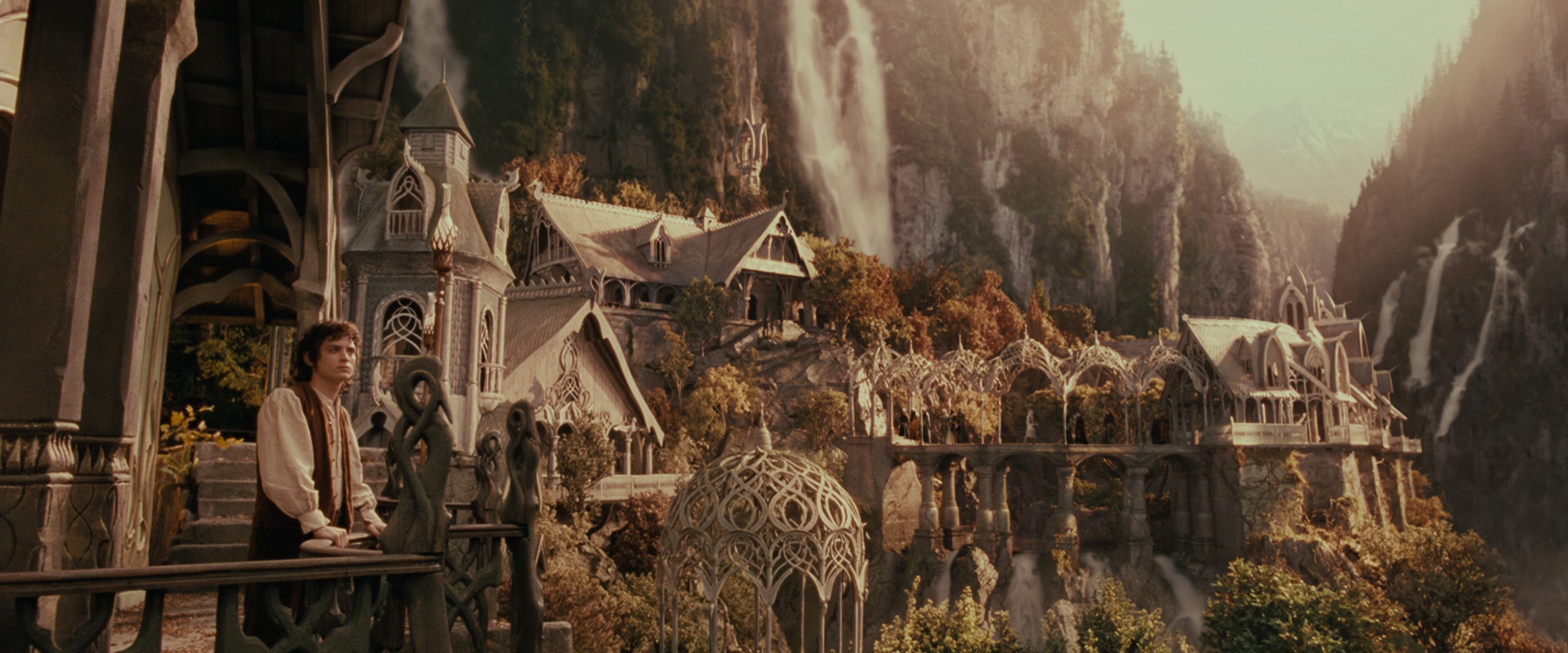 |
| Rivendell |
6. The story line. It's difficult, without giving spoilers, to draw out the story line so that we can all stand back and admire. It's sad, triumphant, and stirring by turns. I would say it is realistic, but this risks giving the impression that it is one of those depressing modern novels where everyone is suicidal, that people try to defend by saying "it's realistic." No, that's just bleak. Or perhaps it is a realistic picture of what life would be like with everything of God removed (of course, then there would be no earth or life at all). Tragic things happen (the party tree! sniff), which are not always reversible. People die. But "A new day will come. And when the sun shines it will shine out the clearer." (Once again quoting lines from the movie, but the feeling from the book.)
Bonus: I love how disparagingly Tolkien talks of "progress" and industrialization. For, I feel the same way!
Do I recommend this book, and to whom? I certainly would. It is suitable (content-wise) for any age, but I will say that when I first read it (age 10 or so) I did not appreciate is nearly as much as I do now. I felt *cough* that it was too descriptive. Bear in mind that at this age I also thought Jane Austen should speak plainer. I had not yet learnt a real love for words, in and of themselves.
The word "d--n" is used once or twice.
Your servant, Mr. Baggins—

*And I quote Colonel Brandon from Sense and Sensibility. Incidentally, I love this line because of the contrast between this scene with Elinor and Willoughby's "explanation" to Elinor, in which he tries to wound her feelings.